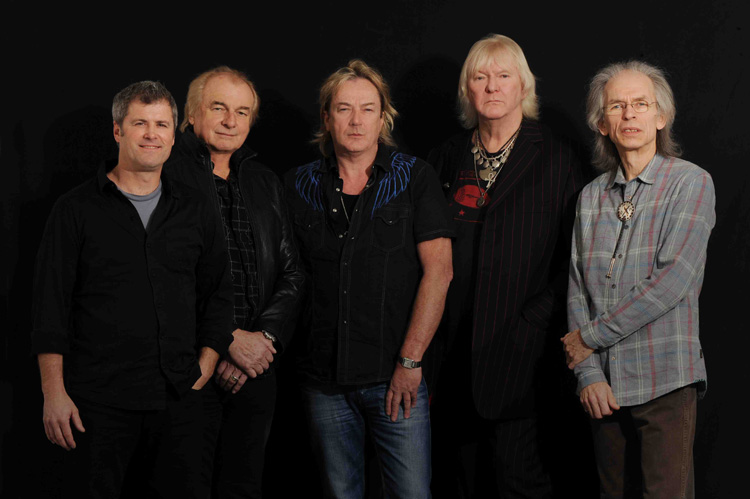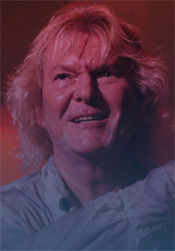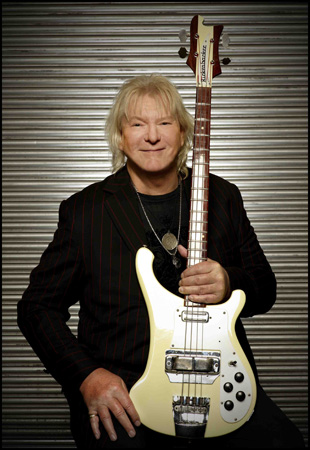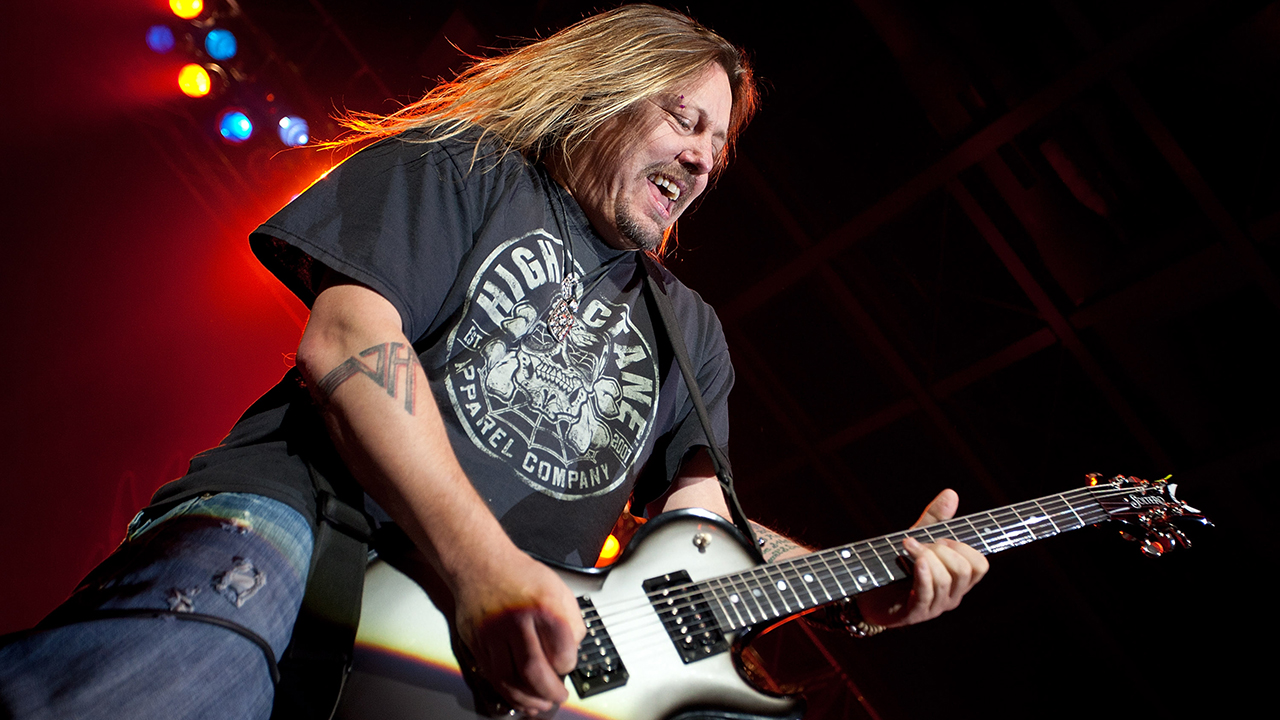Interview: Chris Squire of Yes Discusses ‘Fly From Here,’ the Band’s First Album in 10 Years
All the latest guitar news, interviews, lessons, reviews, deals and more, direct to your inbox!
You are now subscribed
Your newsletter sign-up was successful

Change — in the form of musical direction and band lineups — has been a familiar part of the Yes story for more than three decades.
So it’s no surprise that the lead vocalist on the band’s upcoming studio album, Fly From Here, is Benoit David, the former frontman of a Montreal-based Yes cover band.
“He was in a band called Close to the Edge,” says Chris Squire, Yes’ bassist and founder. “I was in the middle of doing something else when a friend was showing me this band on a website, so I was sort of distracted. I asked him, ‘Which Yes show is this?’ And he said, ‘It’s not Yes.’ I looked closer, and I realized it wasn’t, but it sounded just like us. That’s how I was given Benoit’s information.”
Yet Fly From Here, the band’s first studio album since 2001’s Magnification, also is something of a throwback. It features classic-lineup members Squire on bass, Steve Howe on guitar and Alan White on drums, and marks the return of keyboardist Geoff Downes and producer Trevor Horn, thus recalling the band’s early ‘80s Drama era.
What’s more, the album’s five-part suite (plus overture) is based on “We Can Fly From Here,” a piece of music written more than 30 years ago, a live version of which from 1980 appears on 2005’s The Word is Live album.
Guitar World recently spoke to Squire about the new album, the new singer, his old Rickenbacker bass and his ongoing working relationship with Steve Howe.

GUITAR WORLD: The new album is based on a piece of music that's more than 30 years old. What’s the story behind it, and how did it become the basis of an album in 2011?
All the latest guitar news, interviews, lessons, reviews, deals and more, direct to your inbox!
A lot of the music that's part of that suite now is actually new music or music that's never been put together before. But the main track we did record on The Word is Live. It’s a live version of "We Can Fly From Here" that’s actually from Madison Square Garden. So it's an interesting reference, and you can see what was then and what we made it into now. Now it's a 23-minute-long piece with different movements and different ideas in the classic Yes style. All I can say about it is we achieved a pretty good job on it.
With the return of Geoff Downes on keyboards, your current lineup is very similar to that of the Drama era. Did producer Trevor Horn (also the vocalist on Drama) ever consider singing on this album?
Trevor actually is singing backup, so his voice is on there. But all the lead vocals are by Benoit, and honestly, I don’t think Trevor was really ever interested in becoming the singer again. You have to have quite an agile voice in the higher range to do some of those older Jon Anderson Yes songs, and I don’t think Trevor would be up for that. But he still sings really well, actually, as a matter of interest.
You and Jon Anderson had such great vocal chemistry. How’s the chemistry when singing with Benoit David?
It's true that Jon and I, obviously after working together for so long, assume some of each other's inflections and style. But very fortunately, with Benoit David, that seems to have become a good blend as well, and it's demonstrated very well on new the album.
Benoit was in a Yes cover band. This must be a dream come true for him.
Yes, it’s worked out well. We weren’t sure how it was going to go, but we went on the road for a couple of years, and he got used to the idea of being the singer. A lot of the Yes fans seem to think he was pretty decent, so it’s all gone better than expected, really.
When was the album recorded and finished?
We started in October, November, and we had a break over the holiday period and reconvened in mid-January till the end of February. We finished the recording, most of it except for vocals, which we finished in London in April.
Yes have gone through several transformations, yet you’ve always been the bass player. What has it been like to watch everything change around you?
The fact that I’ve been there the whole time, it’s been more by default than by design, really. It’s a question of — I’m standing there and people have just come and gone, and people in the case of Rick Wakeman and Jon Anderson, those guys have left and rejoined on a number of occasions, so it’s a bit like, when others have gone off to fulfill their solo interests, I’ve just sort of been left there. It’s quite often they’ve come back and left again and come back and left again. That just seems to be the history of Yes.
You’ve always been associated with your Rickenbacker RM1999 bass. Is that still what you’re using?
Yes. On this current album, I think I used about four different instruments. Probably the Rickenbacker wins out on being on more on the album than the others. But yes, I’m basically still using the original bass I bought in 1964 and have played ever since.
Did you buy it new?
Yes, I did, brand new. It’s been kind of altered over the years, especially in my first 10 years of owning it. It had decorative, flower-power wall paper, and then silver paper, and so quite often it was — when I got bored with those phases, it would get refinished, and it would get planed down. Obviously with all those changes, it has a lighter body mass, which in some ways, gives it its individual sound. That’s why, in a lot of cases, people who went out and bought Rickenbacker basses because they wanted to sound like me, that wasn’t always possible, unless you shaved some of the wood off first, reducing the weight.
I’d say you and Paul McCartney were among the biggest Rickenbacker representatives.
Yes. Of course, Paul McCartney’s sound is different from mine, but it’s the way you hear things, really. Paul’s Hofner bass playing doesn’t sound that different than his Rickenbacker bass playing. It’s more the player than the instrument, I think — or the way the player wants to hear things.
Speaking of your bass sound, I think when most people think of “the Chris Squire sound,” they picture your distinctive sound on “Roundabout.”
Yeah, it’s like the “Chris Squire quintessential.”

Would you say your bass sound has changed much over the years?
Well, no. I still basically use the same kind of tone settings. I’m still using the 100-watt Marshall amp I’ve had since the mid-’60s. It still works, but of course, it has been through periods of needing work; it’s been broken down, had repairs. And nothing ever gets replaced with the same components because they’re not available all the time because they’re extinct now.
So in small increments, the sound has changed. I’ve had to replace parts in the basses when they’ve gotten old or worn out, so everything isn’t absolutely original. But where I could, I try and find a guitar from the same vintage and raid it for parts, which I have done with a couple of other basses from the same time.
With so many versions of the band throughout the years, is there one that stands out as the strongest or most rocking?
The thing is, every era of Yes has had something to say. It’s distinctly different — the Steve Howe guitar style and, of course, when Trevor Rabin was in the band in the ‘80s going into the ‘90s. He definitely was a different style of guitar player. So that sort of changed the band quite a bit in some ways, but there’s me and Alan White who are still playing, so yeah, things have moved around in the Yes sound picture, but basically, things have stayed the same as well. So I can’t really say which version is the more kickass because every version has come up with something good.
How’s your working relationship with Steve Howe?
I’ve known Steve for so long, it’s kind of like an old marriage, really [laughs]. I mean it has its ups and downs, but we’ve never had any arguments or confrontations of any note. Obviously there's been some differences of opinions over the years on various musical as well business approaches, but generally we have a good relationship.
I hear you and he were sort of an “Odd Couple,” great friends but opposites in many ways.
Yeah, we are quite different. Steve is still a vegetarian and has been for 40 or 50 years. I went through phases of that as well, but I sort of have a different … Yeah, our styles are different, but the great thing is that when we play together, I think we both enjoy each other's playing. That's the good side to it.
Will the song selection on your current tour cover every Yes era?
Well, we obviously want to introduce some elements from the new album and, until we get together to rehearse, which we're going to do a week before the tour, I have to know how much of it we'll do. And, of course, we're on the show with Styx, so that cuts down the amount of time we would normally have. So we'll have an injection of the new album, and, of course, we will play songs people have come to regard as their favorite Yes songs over the years. It's going to be a summer rock ’n’ roll-y tour, so we'll play it pretty straightforward.
Fly From Here comes out July 12 via Frontiers Records. The single, “We Can Fly (Radio Edit),” is available digitally now.

Damian is Editor-in-Chief of Guitar World magazine. In past lives, he was GW’s managing editor and online managing editor. He's written liner notes for major-label releases, including Stevie Ray Vaughan's 'The Complete Epic Recordings Collection' (Sony Legacy) and has interviewed everyone from Yngwie Malmsteen to Kevin Bacon (with a few memorable Eric Clapton chats thrown into the mix). Damian, a former member of Brooklyn's The Gas House Gorillas, was the sole guitarist in Mister Neutron, a trio that toured the U.S. and released three albums. He now plays in two NYC-area bands.
